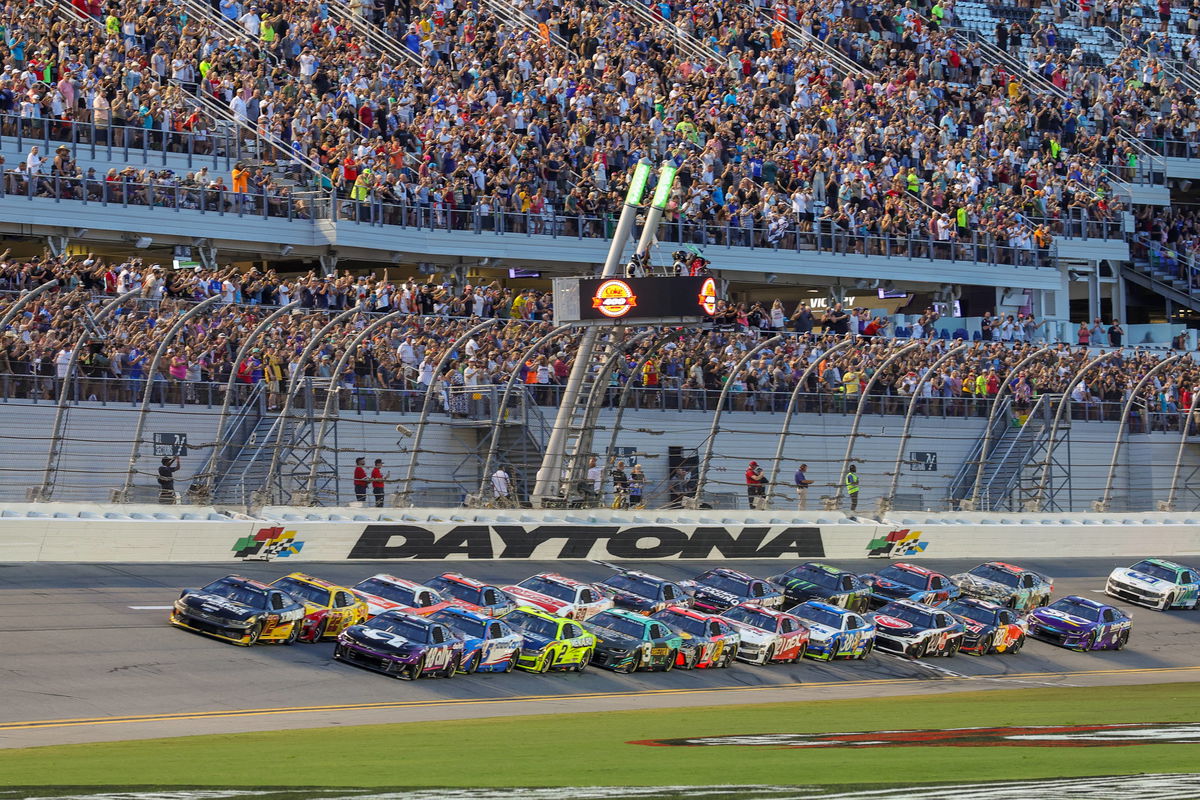
Imago
NASCAR, Motorsport, USA Coke Zero Sugar 400 Aug 23, 2025 Daytona Beach, Florida, USA Drivers get the green flag to start the Coke Zero Sugar 400 at Daytona International Speedway. Daytona Beach Daytona International Speedway Florida USA, EDITORIAL USE ONLY PUBLICATIONxINxGERxSUIxAUTxONLY Copyright: xMikexWattersx 20250823_tbs_sk4_324

Imago
NASCAR, Motorsport, USA Coke Zero Sugar 400 Aug 23, 2025 Daytona Beach, Florida, USA Drivers get the green flag to start the Coke Zero Sugar 400 at Daytona International Speedway. Daytona Beach Daytona International Speedway Florida USA, EDITORIAL USE ONLY PUBLICATIONxINxGERxSUIxAUTxONLY Copyright: xMikexWattersx 20250823_tbs_sk4_324
The whispers of change have turned into a thunderous official announcement, setting a new precedent for “The Great American Race.” The genesis of the Daytona 500’s scheduling is deeply intertwined with the creation of the Daytona International Speedway itself. The inaugural race was held on February 22, 1959, coinciding with the grand opening of Bill France Sr.’s ambitious 2.5-mile tri-oval.
Watch What’s Trending Now!
From 1982 onward, the Daytona 500 cemented its status as the official season opener for the NASCAR Cup Series, becoming symbolically associated with the Presidents’ Day weekend, often falling on the third Sunday of February. The informal nickname of the “Super Bowl of Stock Car Racing” came with an increasing irony as the actual NFL Super Bowl was held two weeks before the Daytona 500. However, the NFL’s desire for an extended regular season, first with the shift from a 16-game to a 17-game schedule in 2021, started pushing the Super Bowl date further into February.
But now, the mounting scheduling conflict has finally forced a long-anticipated move. Recently, NASCAR correspondent Bob Pockrass confirmed the significant change, announcing, “Daytona announces Daytona 500 in 2027 will be Feb 21, weekend after President’s Day. That will avoid conflict with Super Bowl.”
This calculated adjustment is a direct response to the NFL’s scheduling for Super Bowl LXI, which is projected to fall on February 14, 2027. This is the first time after 10 years that NASCAR has maneuvered away from its traditional date, holding the inaugural race on 21st February in 2016.
Daytona announces Daytona 500 in 2027 will be Feb 21, weekend after President’s Day. That will avoid conflict with Super Bowl.
— Bob Pockrass (@bobpockrass) October 22, 2025
The urgency for this schedule shift is underscored by the comparative ratings struggle NASCAR has faced against the behemoth that is the NFL, especially during the fall playoffs. While the overall viewership for the NASCAR Cup Series saw a modest increase, with an average of approximately 2.89 million viewers per race, the difference becomes stark when compared to the NFL.
Even a single regular-season Sunday afternoon NFL game can easily draw upwards of 15 to 20 million viewers. Moreover, the 2024 Daytona 500 itself saw a notable drop in viewership, recording around 5.96 million viewers, a significant decrease from the 8.17 million the year prior.
So, while the move is a pragmatic step to protect the event’s television audience and media footprint, it inevitably ripples through the rest of the NASCAR calendar. The new date will extend the entire season by a week, potentially pushing the championship finale closer to Thanksgiving or into December, sparking passionate debate among the sport’s most loyal fans.
Fan anger and nostalgia grow for the ‘Old’ 500
One fan wrote, “The gods were very angered the last time they moved it a week later,” referring to the 2012 Daytona 500, the first time in its history the race was fully postponed from its scheduled Sunday date. A horrific moment happened when Juan Pablo Montoya crashed into a jet dryer truck under caution, causing a massive fireball that sent an estimated 200 gallons of jet fuel spilling onto the track.
This incident resulted in a two-hour, five-minute red flag for cleanup, which notoriously involved using household Tide laundry detergent to break down the fuel before the race could finally be completed in the early hours of Tuesday morning. Another fan added, “Ah yes welcome back 2016 Daytona 500 type date same date as 2016 history repeats itself.”
The 2016 event, won by Denny Hamlin over Martin Truex Jr. by an unprecedented 0.010 seconds in the closest finish in race history, is a highly remarkable instance of the race running on this slightly later date. While one fan opined, “No kidding. The real reason they added the games in Europe is an excuses to be on TV from 9am to 11pm on Sunday. They don’t care about the market in Europe they just want to dominate TV even more. If they gain international fans along the way it’s a bonus. It’s genius.”
By scheduling games in London and Frankfurt for a 9:30 a.m. ET kickoff, the league effectively creates a new, exclusive time slot that pre-empts the typical 1:00 p.m. ET Sunday broadcasts. This extended coverage provides an unprecedented full day of football, satisfying network partners like NFL Network and driving massive viewership, such as the record 9.2 million viewers for the Dolphins-Chiefs game from Frankfurt in 2023.
Some fans criticized the decision, saying, “NASCAR would be like “hey we heard everyone wanted a 36 race format, so we made the season 36 straight weeks!”” For example, the 2025 Cup Series schedule had only one pre-planned off-week, which was the Easter weekend, meaning teams face over 30 straight weekends of racing. This forced a constant, brutal cycle of teardown, repair, building new cars, and cross-country travel.
This mirrors the demanding schedules of the “Grand National Era” before 1972, where drivers might compete in over 40-60 races a year, like the 62-race schedule in 1964, cementing the public perception that NASCAR is always looking to maximize the number of events.
Another fan wrote, sarcastically, “Can’t wait till we’re running the 500 in March!” Another pattern of rain wreaking havoc on the traditional Sunday schedule has led to a growing resignation among fans that a full postponement into the next calendar month is becoming an almost inevitable occurrence.
For now, fans must simply hold tight to the dwindling tradition of February’s sacred Sunday.



